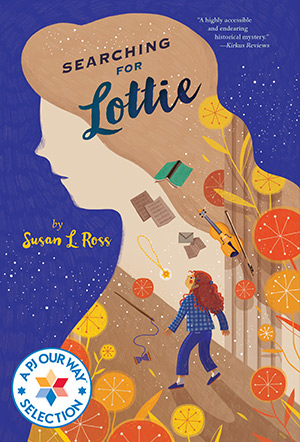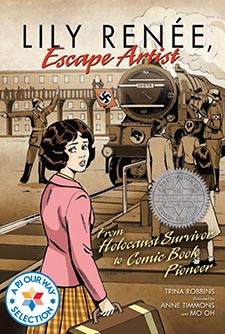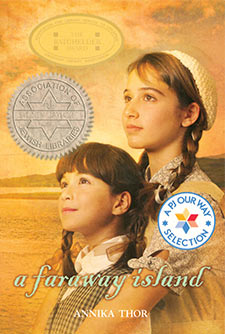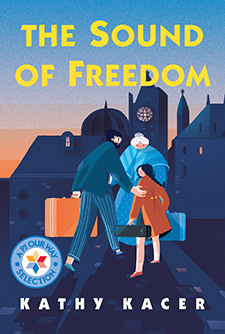Searching for Lottie
Charlie’s namesake, Charlotte, hasn’t been heard of since the war. Charlie’s determined to solve the mystery of what happened to her great-aunt Lottie, but is she ready to discover the truth?
Average Rating
( hint: Login to leave a review! )
168 Reviews
Leave Review
What the Book is About
Jewish Content & Values
Positive Role Models
Content Advisory
Talk it Over!
More for You
What the Book is About
When seventh grader Charlie is assigned a family research project at school, she becomes fascinated by the story of her namesake, Charlotte (Lottie), the mysterious child prodigy violinist who disappeared from Hungary during the Holocaust. Charlie is an aspiring violinist too, and she’s inspired and more than a little intimidated by Lottie’s musical success. Highlighting a lovely generation-to-generation connection, Charlie reaches out to her beloved Nana Rose to learn more about her long-lost older sister. This sweet and poignant book offers a soft, age-appropriate look into pre-war life in Vienna and the personal family tragedies of the Holocaust through the eyes of a modern young teen. It is based on the true story of the author’s family.
Jewish Content & Values
- Charlie attends Hebrew School and researches the life of her great-aunt Lottie during the Holocaust. She receives a Jewish star necklace from her Nana, mentions her upcoming bat mitzvah on multiple occasions, and celebrates Hanukkah.
- There’s a lot of description of Jewish life in Vienna before the war.
Positive Role Models
- Charlie is persistent and determined to find out what happened to Lottie. She’s kind and sensitive with a strong Jewish identity.
- Lottie was a dedicated young musician who was determined to build a career as a violinist. During the war, she was active in the Resistance.
Content Advisory
Although this book’s focus is mainly on nostalgic pre-war details and Charlie’s middle-grade experiences, Lottie’s life does take place against the terrible backdrop of the Holocaust. Charlie is fully aware – and the reader is too – that so many families were lost. Mentions of six million dead, children in prison uniforms, and families taken away are noted without graphic detail, except for one brief reference to a photograph of piles of shoes left behind by people who were killed.
Talk it Over!
Nana Rose rarely talked about her childhood when Charlie’s mom was growing up. Why do you think she felt more comfortable talking about her family history now with Charlie? Have you ever spoken with your grandparents about their childhoods?
More for You
Lottie is part of a long line of Jewish violinists stretching back well over a century: Jascha Heifetz, Bronislaw Huberman, Nathan Milstein, Pinchas Zukerman, Isaac Stern, Yehudi Menuhin, Itzhak Perlman, Joshua Bell, Maxim Vengerov… the list goes on. The violin was an integral instrument in the Eastern European Jewish groups of traveling musicians that played at simchas (this music would become known as klezmer).
Until the Russian Revolution in 1917, Jews living in the Russian Empire were forced to live in the Pale of Settlement and were excluded from many professions. Music was an exception, and classical music, higher in status than folk music, became a way for Jews to escape poverty: In addition to the violinists, many of the world’s greatest pianists and cellists were also Jews with origins in the Russian Empire. Although just five percent of the population of the Russian Empire was Jewish, at one time, the Saint Petersburg Conservatory student body was over 50% Jewish – and in Odessa the number was 80%!
What the Book is About
What the Book is About
When seventh grader Charlie is assigned a family research project at school, she becomes fascinated by the story of her namesake, Charlotte (Lottie), the mysterious child prodigy violinist who disappeared from Hungary during the Holocaust. Charlie is an aspiring violinist too, and she’s inspired and more than a little intimidated by Lottie’s musical success. Highlighting a lovely generation-to-generation connection, Charlie reaches out to her beloved Nana Rose to learn more about her long-lost older sister. This sweet and poignant book offers a soft, age-appropriate look into pre-war life in Vienna and the personal family tragedies of the Holocaust through the eyes of a modern young teen. It is based on the true story of the author’s family.
Jewish Content & Values
Jewish Content & Values
- Charlie attends Hebrew School and researches the life of her great-aunt Lottie during the Holocaust. She receives a Jewish star necklace from her Nana, mentions her upcoming bat mitzvah on multiple occasions, and celebrates Hanukkah.
- There’s a lot of description of Jewish life in Vienna before the war.
Positive Role Models
Positive Role Models
- Charlie is persistent and determined to find out what happened to Lottie. She’s kind and sensitive with a strong Jewish identity.
- Lottie was a dedicated young musician who was determined to build a career as a violinist. During the war, she was active in the Resistance.
Content Advisory
Content Advisory
Although this book’s focus is mainly on nostalgic pre-war details and Charlie’s middle-grade experiences, Lottie’s life does take place against the terrible backdrop of the Holocaust. Charlie is fully aware – and the reader is too – that so many families were lost. Mentions of six million dead, children in prison uniforms, and families taken away are noted without graphic detail, except for one brief reference to a photograph of piles of shoes left behind by people who were killed.
Talk it Over!
Talk it Over!
Nana Rose rarely talked about her childhood when Charlie’s mom was growing up. Why do you think she felt more comfortable talking about her family history now with Charlie? Have you ever spoken with your grandparents about their childhoods?
More for You
More for You
Lottie is part of a long line of Jewish violinists stretching back well over a century: Jascha Heifetz, Bronislaw Huberman, Nathan Milstein, Pinchas Zukerman, Isaac Stern, Yehudi Menuhin, Itzhak Perlman, Joshua Bell, Maxim Vengerov… the list goes on. The violin was an integral instrument in the Eastern European Jewish groups of traveling musicians that played at simchas (this music would become known as klezmer).
Until the Russian Revolution in 1917, Jews living in the Russian Empire were forced to live in the Pale of Settlement and were excluded from many professions. Music was an exception, and classical music, higher in status than folk music, became a way for Jews to escape poverty: In addition to the violinists, many of the world’s greatest pianists and cellists were also Jews with origins in the Russian Empire. Although just five percent of the population of the Russian Empire was Jewish, at one time, the Saint Petersburg Conservatory student body was over 50% Jewish – and in Odessa the number was 80%!




